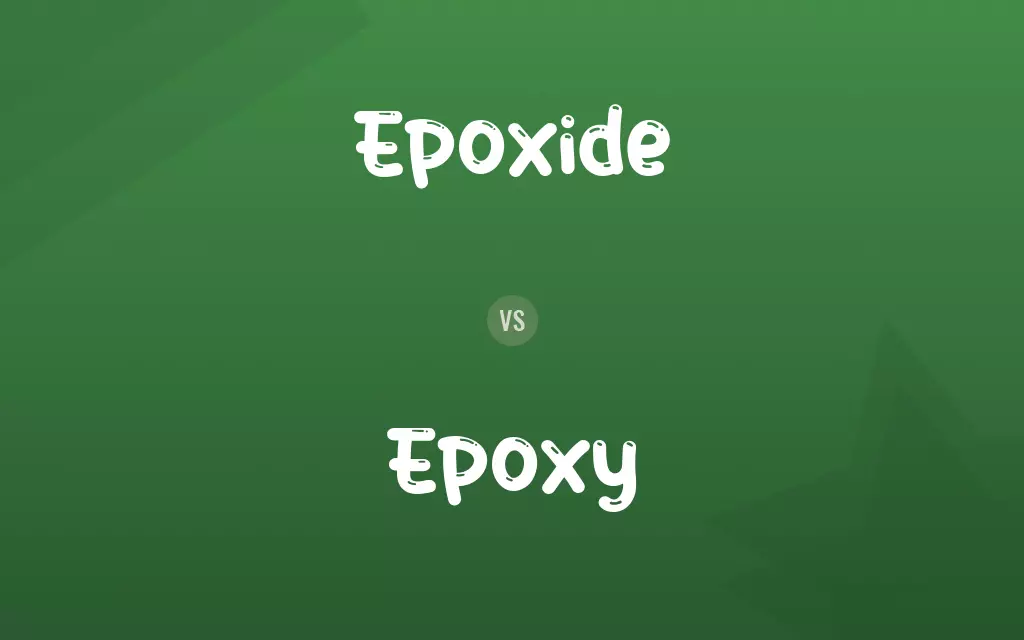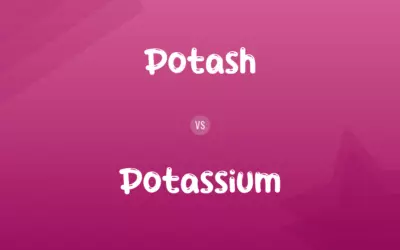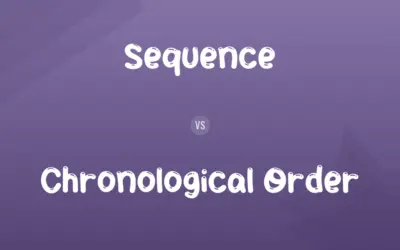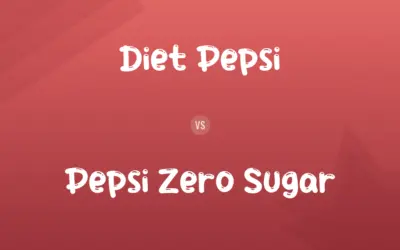Epoxide vs. Epoxy: Difference and Comparison
By Muazma Batool & Muneeza Rehman — Updated on February 27, 2024
Epoxide refers to a specific chemical group featuring an oxygen atom connected to two adjacent carbon atoms in a cyclic ether. Epoxy refers to polymer materials or resins made from epoxide monomers, known for their strong adhesive properties.

Difference Between Epoxide and Epoxy
Epoxides are characterized by their three-membered ring structure, making them highly reactive and useful as intermediates in organic synthesis and industrial processes. Epoxy resins, derived from epoxides, are noted for their exceptional adhesive properties, durability, and resistance to chemicals and heat.
Muazma Batool
Feb 27, 2024
The production of epoxides often involves the oxidation of alkenes, a foundational step in synthesizing a wide range of chemicals. Epoxy resins are synthesized by reacting these epoxides with polyamines, polyphenols, or other agents, creating materials that can be tailored for specific applications.
Muazma Batool
Feb 27, 2024
Epoxides serve as a key intermediate in creating various chemicals, including pharmaceuticals, agrochemicals, and synthetic polymers. Epoxy resins, on the other hand, are extensively used in coatings, adhesives, the aerospace industry, electronics, and as composite materials.
Muazma Batool
Feb 27, 2024
Due to their strained ring structure, epoxides are highly reactive, easily opening up for further chemical transformations. This reactivity is harnessed in epoxy resins to form strong, cross-linked polymer networks when cured with hardeners.
Olivia
Feb 27, 2024
The distinction between epoxides and epoxy lies not just in their chemical structure but also in their application. Epoxides are fundamental building blocks in organic chemistry, while epoxy encompasses a vast range of industrial and commercial products designed for strength, adhesion, and resistance.
Leo
Feb 27, 2024
Epoxide vs. Epoxy Comparison Chart
Definition
A cyclic ether with a three-membered ring.
A class of polymers and prepolymers.
Muazma Batool
Feb 27, 2024
Composition
Contains an oxygen atom bonded to two carbon atoms in a ring.
Made from epoxides reacted with a hardener.
Muazma Batool
Feb 27, 2024
Reactivity
Highly reactive due to the strained ring.
Reactivity used to form durable polymers.
Muazma Batool
Feb 27, 2024
Significance
Key building blocks in organic chemistry.
Widely used in industrial and commercial applications.
Leo
Feb 27, 2024
Epoxide vs. Epoxy Definitions
◉Epoxide
A reactive organic compound with a three-membered ring.
Ethylene oxide is an epoxide used in sterilizing medical equipment.
Muazma Batool
Feb 27, 2024
◉Epoxy
Cures to form a hard, resistant material.
Epoxy coatings protect floors from wear and chemical damage.
Muazma Batool
Feb 27, 2024
◉Epoxide
Produced by alkene oxidation.
Propylene is oxidized to propylene oxide, a widely used epoxide.
Henry
Feb 27, 2024
◉Epoxy
Versatile in applications from art to industry.
Artists use epoxy for creating 3D effects on paintings.
Levi
Feb 27, 2024
◉Epoxide
Found in natural products.
Epoxides occur in some marine natural products with biological activity.
Nolan
Feb 27, 2024
◉Epoxy
Integral in aerospace composites.
Epoxy composites are used in aircraft for their strength-to-weight ratio.
Muazma Batool
Feb 27, 2024
◉Epoxide
Used in polymer science.
Epoxides are essential for creating certain types of polyethers.
Nolan
Feb 27, 2024
◉Epoxy
Used in electronic components for insulation.
Epoxy encapsulates electronic components, protecting them from moisture.
Olivia
Feb 27, 2024
◉Epoxide
Intermediate in synthesizing complex molecules.
Epichlorohydrin, an epoxide, is crucial for producing glycerol.
Muazma Batool
Feb 27, 2024
◉Epoxy
A thermosetting polymer known for its strong adhesion.
Epoxy resins are used to bond metal surfaces in automotive manufacturing.
Muazma Batool
Feb 27, 2024
◉Epoxide
A ring-shaped organic compound consisting of an oxygen atom bonded to two other atoms, usually of carbon, that are already bonded to each other.
Muazma Batool
May 03, 2023
◉Epoxy
Any of various usually thermosetting resins capable of forming tight cross-linked polymer structures characterized by toughness, strong adhesion, and low shrinkage, used especially in surface coatings and adhesives.
Muazma Batool
May 03, 2023
◉Epoxide
A compound containing such a structure. In both senses also called epoxy.
Muazma Batool
May 03, 2023
◉Epoxide
(organic chemistry) Any of a class of organic compound, cyclic ethers, having a three-membered ring; they are prepared by the selective oxidation of alkenes or by ring-closure of halohydrins; used to make plastics.
Muazma Batool
May 03, 2023
◉Epoxide
(organic chemistry) Any similar compound in which an ether linkage has been made across a larger ring.
Muazma Batool
May 03, 2023
Epoxide vs. Epoxy Frequently Asked Questions
Why are epoxy resins preferred in high-performance applications?
Due to their excellent adhesion, chemical and heat resistance, and mechanical properties, epoxy resins are ideal for demanding applications.
Muazma Batool
Feb 27, 2024
Are all epoxy products made from synthetic epoxides?
While many epoxies are derived from synthetic epoxides, natural sources and bio-based epoxides are also being developed for more sustainable epoxy resins.
Lucas
Feb 27, 2024
How are epoxy resins cured?
Epoxy resins are cured by adding hardeners, which cause a chemical reaction that forms a strong, cross-linked polymer network.
Muazma Batool
Feb 27, 2024
Can epoxides be found in nature?
Yes, epoxides are present in some natural products and play a role in biological processes and as intermediates in biosynthesis.
Muazma Batool
Feb 27, 2024
What makes epoxides so reactive?
The three-membered ring structure of epoxides is strained, making them highly reactive and prone to ring-opening reactions.
Muazma Batool
Feb 27, 2024
How versatile are epoxy resins in terms of customization?
Epoxy resins can be customized with various hardeners, fillers, and additives to achieve specific properties, making them extremely versatile for different applications.
Lucas
Feb 27, 2024
Can epoxy resins be used in outdoor applications?
Yes, with the addition of UV stabilizers and other additives, epoxy resins can be formulated for outdoor use with enhanced weather resistance.
Leo
Feb 27, 2024
How do the properties of epoxides influence the characteristics of epoxy resins?
The reactivity of epoxides allows for the creation of densely cross-linked epoxy polymers, contributing to their strength, durability, and resistance.
Olivia
Feb 27, 2024
What are the environmental considerations with epoxy use?
The production and disposal of epoxy resins involve chemicals that can be harmful if not managed properly, driving research into more eco-friendly alternatives.
Nolan
Feb 27, 2024
What role do epoxides play in medicinal chemistry?
Epoxides are important intermediates in synthesizing a wide range of pharmaceuticals, exploiting their reactivity for constructing complex molecular architectures.
Elijah
Feb 27, 2024
Content Creators
Written by
Muazma BatoolAs a content editor, Muazma Batool is not just a grammar guru but a creative mastermind who breathes life into every word. With an eagle eye for detail and a passion for storytelling, she transforms bland text into engaging content that captivates audiences and drives results.
Co-written by
Muneeza RehmanAt Comparisons.wiki, Muneeza skillfully navigates the vast sea of information, ensuring clarity and accuracy as the lead content editor. With a keen eye for detail, she curates every comparison to enlighten and engage readers.

































